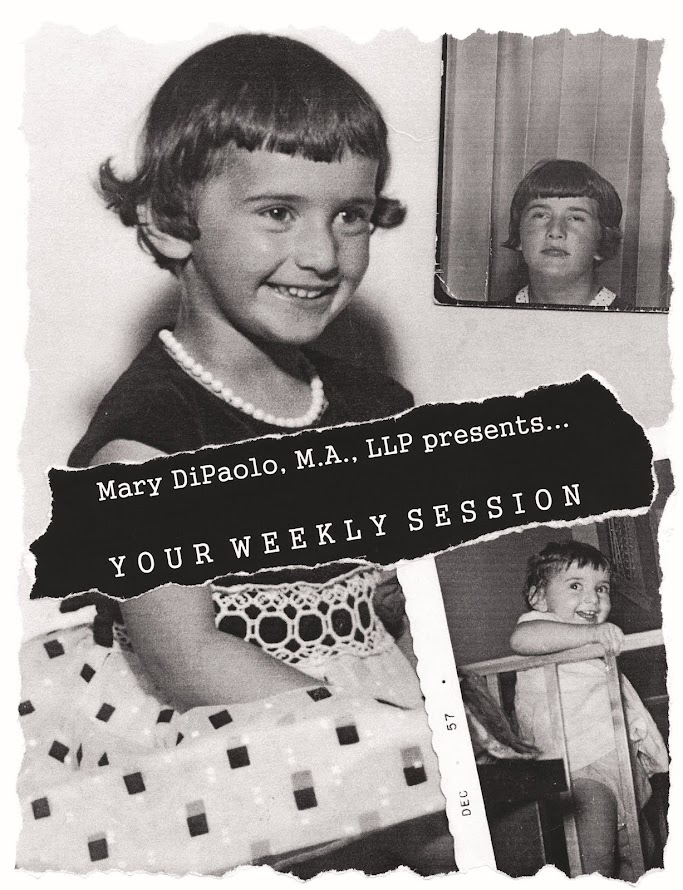As for me, I can remember lying down behind the sectional sofa as a tiny child watching the feet of my parents walk in and out of our living room. If those feet kept moving without any major noise to accompany them, then perhaps I could disentangle myself from back there and go somewhere else in the house. But if the feet stopped...and the noises escalated...I wasn't moving an inch. This is one of my earliest memories from around the age of three. How about you? And what's the point of remembering these kind(s) of things from your past? Do our memories of the worst things that occurred in our past matter? If so, why? Well, this is what today's blog post is all about; why the worst things from our personal history DO matter...
As any of my clients will tell you, I do share relevant snippets from my own life in making points to assist clients with their own therapeutic process. It isn't the content of what I share that matters...it is how what I have shared may trigger a memory in them from their own history. Just like the introductory paragraph to my post today...there are many reading this who may also remember "hiding" from their parents' fights as small children. My spot happened to be behind that sweet spot of our sectional sofa that was pushed up against a corner wall. Even though it took decades for me to finally learn the lessons from my parents' fighting lifestyle, I still didn't want to face those lessons in lieu of piles of additional memories and first-hand accounts from my mother and aunt both.
And this is why the worst things that have happened to us matter. Because of the lessons that are there and that we DO need to recognize and apply to our present lives now. Without the lessons, we are truly doomed to repeat what we won't acknowledge and can't heal as a result.
For me, the fighting that went on between my parents was my focus for a long time. I didn't know or care what their fighting was specifically over or about; I was too young to know that he didn't work enough in her mind and she spent way too much money in his. I didn't know that she was extremely insecure and wanted favorable attention pretty much 24/7, and he just wanted to do what he wanted to on any given day. All I knew was to scan the environment (always!) to determine if the switch was turned "Off" versus "On" within either of them.
How my parents' fighting affected me personally started in grade school. I was bullied over being the tallest and the fattest and for wearing the "clodhopper" shoes. That didn't last too long. I can literally remember figuring out in my own head that life was horrible enough at home so it was NOT going to be horrible as well in school! No way! So even when the baddest and meanest bully (boy) in our class came after me in second grade, I was ready. I didn't know how to fight like my parents, but I could sure go for it anyway next time "R" called me his favorite nickname for me. I remember telling "R" I was going to kill him...and I meant it. Grant it, I didn't know how I would kill him or when I would kill him...but I would figure that out later. Remember now, I was in second grade and so was "R". What's that tell you? It tells you my parents taught me well up to that point in my life. All too well as a matter of fact!
What about you? What did your parents teach you about the "best" way to settle disagreements or resolve problems between two people? Perhaps yours fought like mine; perhaps yours were silent and said or did nothing at all. And what are the lessons for us from having these patterns of behavior modeled to us? I'm telling you...it's important to know what we came from and what we learned when we didn't even realize we were learning!
When I see individuals who struggle with specific addictive processes, I always make a point to ask where they learned to use an eating disorder...or drinking...or smoking pot...or gambling...or having sex with anybody...as a "proper" means of coping with their stress and problems. Invariably, very few readily make the connection between how one or both of their parents/adult role models heavily influenced their own future choices. I can remember one client with a wicked eating disorder mentioning at the near end of our session how her mother "popped Ayds like candy". Back in the day "Ayds" was an appetite suppressant that came in the form of little chocolate squares wrapped in wax paper and boxed like fancy candy. As we talked more about her mother's eating and subsequent Ayds habits, my client suddenly realized something she hadn't before. "My God she taught me how to starve myself!" Yes, that was about right. Once my client was able to see how her alternate stuffing-and-then-starving lifestyle was formed..it was easier for her to move past it and eat more gently and in a more balanced manner as part of her own recovery regime.
Few of us want to recall the worst things we've been through, but which is worse? To keep glossing over what happened...and then repeat it through our own modern day interpretation of the same narrative? That's how we get into the re-enactment habit by the way. We try to subconsciously "fix" now what we couldn't fix back then as kids...but instead of fixing it, we just cause ourselves more drama and strife in our present day lives.
Talking to a licensed professional psychotherapist can help here. Don't despise what you've been through; you needed the lessons. We all needed the lessons.
